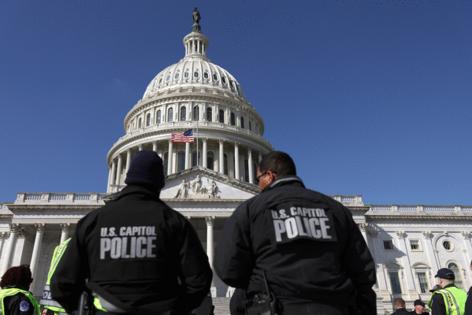They keep Congress running. The shutdown plunged them into uncertainty
Published in Political News
WASHINGTON — Whether the Senate can coalesce around an agreement to fund the government or not, Capitol Police officers will continue showing up to work to protect lawmakers. But unlike the members of Congress who steered the country into a shutdown, those officers won’t collect a paycheck until it’s over.
And it might mean weekend and overnight work, unpaid overtime and unusual hours as lawmakers toil away.
“Stuff like this wreaks havoc on people’s personal lives,” said one officer, who requested anonymity because he is not authorized to speak to the press. “It’s not a 9 to 5 job. I don’t know when I’m going home.”
The partial government shutdown began at midnight on Wednesday after senators rejected dueling short-term spending proposals, largely along party lines. With no immediate end in sight, it kicked off a period of uncertainty for the people who keep the Capitol, congressional offices and support agencies running.
“I kept praying that it wouldn’t close,” said Willie Price, a member of Unite Here Local 23, the union representing contractors who staff many congressional cafeterias. “We don’t know what to do. We don’t know how long it’s going to last,”
Price, who works in a Library of Congress cafeteria, will not collect a paycheck during the shutdown and is not guaranteed backpay once Congress gets its act together.
She has a second job delivering newspapers for The Washington Post, which she does seven days a week. But as print subscriptions have dwindled in recent years, she said that’s become less lucrative. If she doesn’t get back to work soon, she’ll have to make difficult decisions as bills come due later this month.
“I ain’t trying to lose my house,” she said before a press conference with Maryland’s congressional delegation on Wednesday afternoon.
“They get up every day and put on their clothes and go into buildings and work to deliver services for Americans all over this country and they don’t ask, ‘Are you Democrat or Republican?’” Rep. Kweisi Mfume, D-Md., said at the event. “Theirs is the untold story.”
Paycheck to paycheck
Congressional aides and support agency staff also won’t be paid for the duration of the shutdown, but thanks to a 2019 law, they are eligible for backpay once the government reopens.
For many who work on the Hill, the length of the shutdown will be key. A short one is manageable. A drawn-out affair, like the 35-day standoff starting in 2018 over President Donald Trump’s border wall, would be much more painful.
“In the House we’re only paid once a month, so unless this goes past Nov. 1, it’ll just be a very boring month at the office,” said one senior Republican aide, who requested anonymity because he is not authorized to speak to the press.
But for younger staffers who may be scraping by on meager entry-level Hill wages, the clock is ticking. And while staffers are allowed to work second jobs if they’ve been furloughed, landing a gig for an indeterminate period of time that doesn’t conflict with congressional ethics rules is no small feat. For those deemed essential, who will continue to show up to work every day, it’s practically impossible.
“Many staffers — particularly junior staffers — are living paycheck to paycheck,” said Michael Suchecki, spokesperson for the Congressional Progressive Staff Association. “This means, in effect, offices are asking staff to work without immediate pay for an indeterminate amount of time while those staffers may otherwise need to be finding or working a second job to make ends meet until their congressional pay resumes.”
There are some resources for those in a pinch. A sandwich board outside the Senate Federal Credit Union on Wednesday advertised a “government shutdown relief program,” which includes a maximum loan of $5,000 with no payment and 0 percent APR for 90 days. On the House side, the credit union offers a “relief line of credit” of up to $10,000 with 0 percent APR for a 60-day period.
But while short-term loans may pay the bills, they don’t address the morale problems that can arise during a shutdown.
In a statement on Tuesday, Capitol Police union president Gus Papathanasiou urged lawmakers to come to an agreement and noted the toll a shutdown would take on the rank-and-file, who were already on high alert after a series of political assassinations in recent months.
“The biggest challenge right now with protecting Congress is manpower,” Papathanasiou wrote. “Because we do not have enough officers, we are all forced to work enormous amounts of mandatory overtime. We have hundreds of officers who are eligible to retire today, and this potential shutdown gives them one more reason to leave.”
The Capitol Police officer who requested anonymity said he woke up not wanting to come to work on Tuesday as the shutdown loomed. He was supposed to attend a funeral over the weekend, but with the Senate likely to be in, it looked like he’d have to scrap his plans.
“It sucks because Congress doesn’t want to do their job,” he said. “They were not here at all last week. They weren’t working on anything. So it’s frustrating in that sense that you expect us to come to work and do our job, but these guys do nothing for a week, and then try to rush at the last hour to try to get everything done.”
©2025 CQ-Roll Call, Inc., All Rights Reserved. Visit cqrollcall.com. Distributed by Tribune Content Agency, LLC.
























































Comments